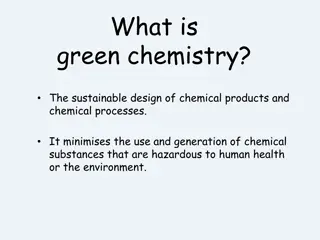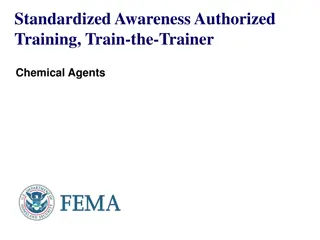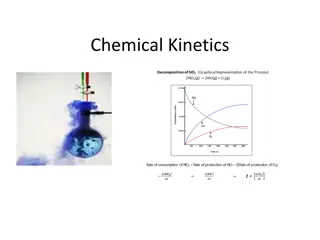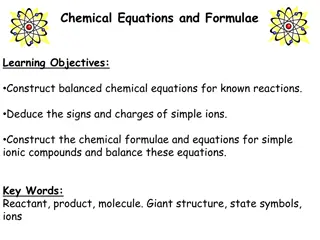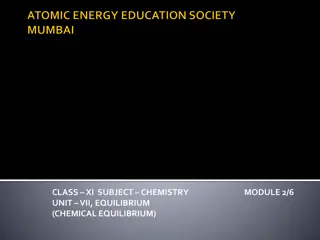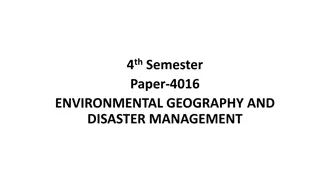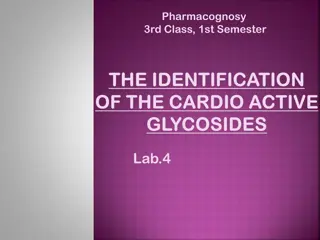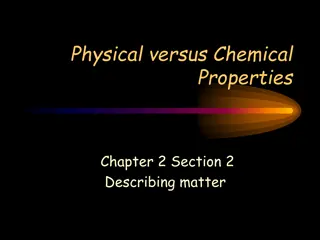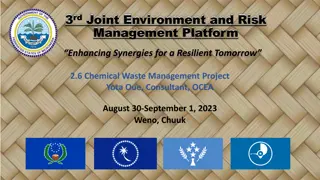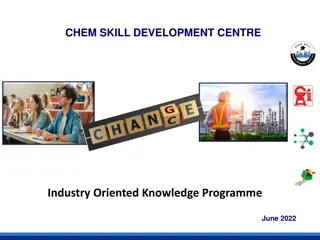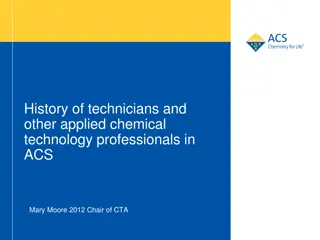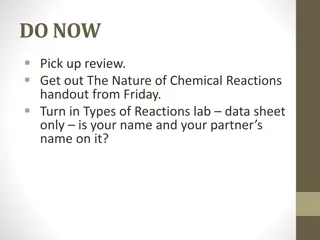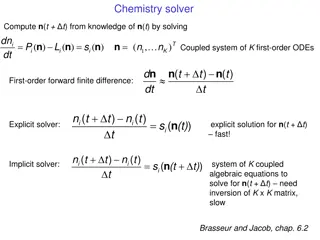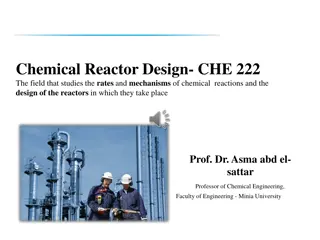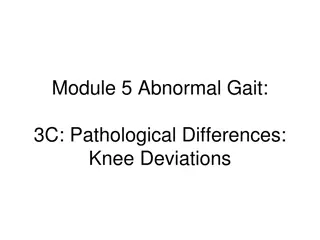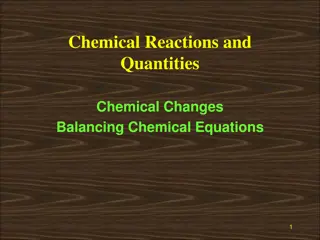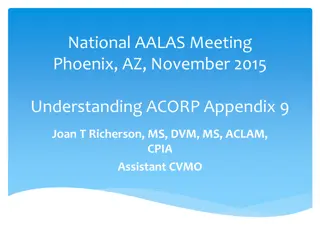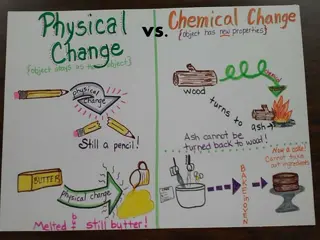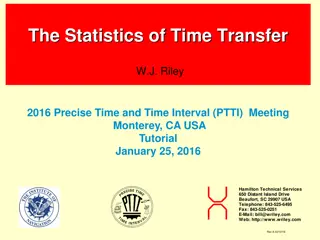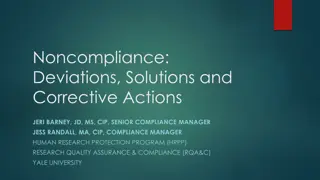Zhejiang Supershine Household Chemical Technology Co., Ltd. - Daily Chemical Manufacturer Overview
Zhejiang Supershine Household Chemical Technology Co., Ltd. is a well-known daily chemical manufacturer in China with a focus on household cleaning products. They offer a range of products including dishwasher cleaning tablets, coffee machine cleaning tablets, and multi-effect floor cleaning tablets
0 views • 35 slides
Presentation to the Portfolio Committee on Higher Education, Science and Innovation(PCHESI)
Mrs. Sesi Nombulelo Nxesi, CEO, presented the Education, Training, and Development Practices Sector Authority's annual report to the Portfolio Committee on Higher Education, Science, and Innovation. The presentation covered overall performance, scope of coverage, responses to underperformance, and a
0 views • 31 slides
Acetyl Chloride Manufacturer Company
Dive into the world of chemical innovation with Modi Chemical, a premier Acetyl Chloride Manufacturer in Gujarat. Explore the cutting-edge processes and stringent quality standards that define our production, ensuring excellence in every molecule. With a commitment to sustainability and technologica
4 views • 1 slides
Mono Chloro Benzene Manufacturer in Gujarat
Discover excellence in chemical manufacturing with Modi Chemical, a premier Mono Chloro Benzene Manufacturer in Gujarat. Experience top-quality products and unmatched service, meticulously crafted to meet your industrial needs. Partner with us to access cutting-edge solutions and unparalleled expert
2 views • 1 slides
Understanding Deviations in Procurement Process
Dive into the world of deviations in procurement, from defining terms to exploring examples and thresholds. Learn how deviations impact the standard procurement procedure and the importance of compliance with regulations and policies.
1 views • 78 slides
Understanding Green Chemistry Principles and Efficiency in Chemical Processes
Green chemistry focuses on designing sustainable chemical products and processes to minimize hazardous substances. It advocates for waste prevention, efficient reactions, and use of raw materials. Chemical engineers play a key role in optimizing percentage yield and atom economy for efficient produc
0 views • 49 slides
Chemical Agents Awareness Training Overview
This training module covers standardized awareness and authorized training on chemical agents, including toxic industrial chemicals, riot control agents, and chemical warfare agents. Participants will learn about the physiological signs/symptoms, advantages/disadvantages of using chemical agents for
1 views • 20 slides
Understanding Chemical Formulas, Reactions, and Equations
Explore the world of chemical formulas, reactions, and equations, understanding how they identify substances and represent the composition of compounds. Learn about the significance of balanced chemical equations and the role of subscripts in indicating the number of atoms present in a molecule. Dis
1 views • 44 slides
Enhancing Chemical Formula Writing Skills for Students
This action research focuses on improving students' ability to write and name chemical formulas. The study addresses challenges in understanding and applying chemical concepts in a general chemistry course. Strategies include utilizing worksheets, group collaboration, and mobile applications to enha
2 views • 13 slides
Understanding Chemical Kinetics: Rates of Reactions and Factors Influencing Them
Chemical kinetics delves into the speed of chemical reactions and the factors that influence reaction rates. This field explores how collisions between atoms, ions, or molecules drive chemical reactions, as well as the role of catalysts, reactant concentration, temperature, and surface area. By unde
0 views • 32 slides
Understanding Chemical Equations and Formulae
Learn to construct balanced chemical equations for known reactions, deduce signs and charges of simple ions, and create chemical formulae for ionic compounds. Understand the concepts of reactants, products, molecules, giant structures, state symbols, and chemical formulas for various substances. Gai
3 views • 7 slides
Understanding Chemical Equilibrium in Reversible Reactions and Laws
Chemical equilibrium in reversible reactions involves the balance between forward and backward reactions, as governed by laws like the law of mass action and the law of chemical equilibrium. These laws help in understanding the rates of reactions, equilibrium constants, and the relationship between
1 views • 12 slides
Ensuring Protocol Compliance and Corrective Action Plans in Clinical Trials
This content discusses the importance of creating Corrective Action and Preventive Action (CAPA) plans for protocol deviations in clinical trials. It covers the components of a CAPA, best practices for creating CAPAs for different deviation types, and regulatory compliance requirements according to
0 views • 33 slides
Effective Protocol Deviation Management in Clinical Research
Understand the importance of handling protocol deviations in clinical trials to ensure patient safety, data integrity, and compliance with regulatory requirements. Explore SOPs, electronic systems, and best practices for managing deviations effectively. Learn about GCP requirements, DMC usefulness,
0 views • 22 slides
High-Level Overview of Purchasing Process for Various Purchase Categories
This training presented by Tamara Cline offers a high-level explanation of the purchasing process for purchases exceeding $10,000, between $10,000 and $88,300, over $88,300, and public works. It covers process deviations resulting in audit findings and corrective action plans without detailed requis
0 views • 20 slides
Understanding NMR Spectroscopy and Chemical Shifts
Nuclear Magnetic Resonance (NMR) spectroscopy is a powerful technique for analyzing molecular structures based on the chemical shifts of protons. In an NMR spectrum, peaks correspond to different protons in a compound, with their positions, intensities, and spin-spin splitting providing valuable inf
0 views • 19 slides
Understanding Chemical Disasters in the Indian Chemical Industry
Chemical disasters pose a significant threat to the Indian chemical industry, impacting human lives, property, and the environment. Factors contributing to these disasters include ageing process plants, human errors, design defects, and natural events. Proper prevention measures, such as hazard iden
0 views • 13 slides
Identification of Cardioactive Glycosides Through Chemical Tests
The laboratory experiments focus on identifying cardioactive glycosides through chemical tests like Baljets Test and Keller-Killians Test. These tests involve reactions with specific reagents to observe color changes and layer formations, helping in the identification of different parts of the glyco
2 views • 11 slides
Understanding Physical and Chemical Properties of Matter
Explore the distinction between physical and chemical properties of matter in Chapter 2, Section 2. Physical properties can be observed without changing the substance's identity, such as color and density, while chemical properties require altering the substance to observe characteristics like react
5 views • 20 slides
Enhancing Synergies for Resilient Tomorrow: Chemical Waste Management Project Overview
Enhancing Synergies for a Resilient Tomorrow outlines a project aimed at strengthening the Federated States of Micronesia's capacity in chemical management. The project focuses on monitoring and evaluating chemical use, enhancing legislative frameworks, and establishing a central database for chemic
1 views • 12 slides
Industry-Oriented Knowledge Programme by CHEM.SKILL.DEVELOPMENT.CENTRE June 2022
CHEM.SKILL.DEVELOPMENT.CENTRE (CSDC) offers an industry-oriented knowledge programme to bridge the gap between theory and practice. The objectives include enhancing employability, providing practical knowledge, building confidence, and understanding industry practices. The programme's strategy invol
0 views • 14 slides
Evolution of Chemical Technicians in ACS: A Historical Overview
The history of chemical technicians within the American Chemical Society (ACS) is traced from the early formation of committees to the advancement of technician roles in the workplace. The involvement of committees such as Committee on Technician Activities (CTA) and Committee on Technician Educatio
1 views • 18 slides
Understanding Chemical Reactions in Chemistry Lab
Explore the fascinating world of chemical reactions in the chemistry lab through hands-on experiments and theoretical knowledge. Learn to identify reactants and products, understand the characteristics of chemical reactions, use appropriate symbols in equations, and balance chemical equations effect
2 views • 22 slides
Understanding Stoichiometry in Chemical Reactions
Stoichiometry is the concept of predicting the amounts of reactants and products in a chemical reaction, similar to following a recipe in cooking. It involves balancing chemical equations and determining the quantities of substances involved. By paying attention to coefficients, one can calculate ho
2 views • 65 slides
Chemical Kinetics and Numerical Solvers in Chemistry
Explore the principles of chemical kinetics and the use of numerical solvers to compute concentrations over time, considering explicit and implicit methods. Understand stability and positivity requirements in solvers and the importance of characteristic time scales in chemical systems. Dive into a s
0 views • 5 slides
Overview of Chemical Reactor Design and Operation
Chemical reactor design involves studying the rates and mechanisms of chemical reactions, as well as the design of reactors for these reactions on a commercial scale. This field combines principles from thermodynamics, chemical kinetics, fluid mechanics, mass transfer, heat transfer, and economics t
0 views • 12 slides
Understanding Pathological Knee Variations in Gait Analysis
Explore different knee deviations in gait analysis, such as limited knee flexion, knee hyperextension, extensor thrust, and excess knee flexion. Learn how these deviations disrupt normal gait patterns, impact muscle demands, and affect shock absorption during various phases of the gait cycle.
1 views • 19 slides
Understanding Chemical Changes and Reactions
Explore the concepts of chemical and physical changes, including balancing chemical equations, physical properties, and examples of chemical reactions. Learn to distinguish between physical and chemical changes through visual aids and learning checks.
0 views • 24 slides
Impact of Board Thickness Deviations on Wire Displacement
In this study by Lee Greenler at UW Physical Sciences Lab, the effect of side and foot board thickness deviations on wire position was analyzed. The displacement of the wire was found to vary based on the cosine factor, with potential displacements up to ~0.5mm near the pin. Different cases were con
0 views • 5 slides
Understanding ACORP Appendix 9: Documentation of Approved Protocol Departures
Appendix 9 serves to document departures approved by the IACUC for a given protocol, allowing inclusion in semiannual reports. It guides users on identifying departures, using the VA Deviations and Departures flowchart, and provides examples for clarity. Criteria for when to use Appendix 9 are outli
0 views • 12 slides
Understanding Deviations and Waivers in Special Education: February 2024 Webinar Insights
The February 2024 Office of Special Education Technical Assistance webinar focuses on deviations, waivers, and ISD plans, aiming to clarify the distinctions between deviations and waivers in special education, providing insights into laws and rules guiding these processes, and outlining application
0 views • 35 slides
Advanced Analysis in Pharmacy: Deviations from Beer-Lambert Law
Explore the complexities of advanced analysis in pharmacy through deviations from Beer-Lambert Law, including real, instrumental, and chemical deviations. Understand limitations, causes of nonlinearity, and the role of instrumentation in spectrophotometry. Dive into topics such as irregular and regu
0 views • 41 slides
Understanding Physical and Chemical Changes in Science Class
Explore the concepts of physical changes and chemical reactions in this interactive science lesson. Students will differentiate between the two types of changes, identify evidence for each, categorize examples, and discuss key concepts with their peers at the table. Through videos and discussions, t
0 views • 21 slides
ASU EHS & FSE Chemical Approval Process Guidelines
Detailed guidelines and forms for the chemical approval process at ASU, including links to important resources, forms for new chemical purchases and transfers, responsibilities for lab managers, and procedures for chemical transfers. The process involves completing forms such as the Prior Approval A
0 views • 5 slides
Understanding Chemical Reactions in Daily Life
Understanding chemistry, particularly chemical reactions, is crucial for our daily lives. Chemical reactions involve the transformation of substances into different ones, described by reactants and products in equations. By learning about chemical equations, word equations, formula equations, and th
0 views • 15 slides
Understanding Time Transfer Statistics in Technical Services
Time transfer in technical services involves transmitting time information between locations, with a focus on statistical measures like Time Deviation (TDEV). This process assesses the noise affecting systems using specialized tools for time and frequency stability analysis. The performance of time
0 views • 29 slides
Understanding Ionic Bonding and Lattice Energy in Chemistry
Chemical bonds play a crucial role in holding atoms together in molecules. This course explores the concept of chemical bonding, focusing on ionic bonds and lattice energy. Topics covered include the different types of chemical bonds, such as electrovalent and coordinate bonds, as well as the models
0 views • 22 slides
Understanding Protocol Deviations in Clinical Trials
Protocol deviations are expected occurrences in clinical trials that may arise from site or participant actions. It is crucial for research teams to identify, report, and learn from these deviations to ensure the integrity and safety of the study. Mechanisms for identifying and reporting deviations,
0 views • 16 slides
Best Practices for Chemical Hygiene and Safety in Laboratories
Responsibilities of the Chemical Hygiene Officer (CHO) include implementing the Chemical Hygiene Plan (CHP), monitoring the chemical life cycle, arranging staff training, conducting safety inspections, assisting staff, and maintaining records. Principals and Science Department Heads support staff in
0 views • 18 slides
Ensuring Compliance in Human Research Programs at Yale University
Yale University's Human Research Protection Program (HRPP) emphasizes the importance of preventing and addressing deviations in research practices. Led by experienced compliance managers, the HRPP RQA&C team at Yale focuses on conducting reviews, responding to research complaints, and developing eff
0 views • 32 slides





